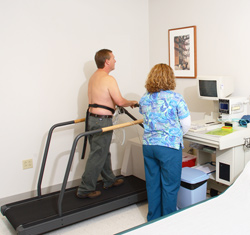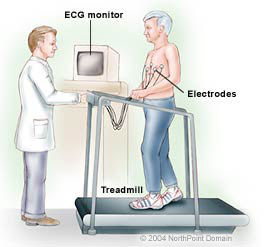Exercise Stress Test
Definition 
This test, typically involving the patient walking on a treadmill while attached to an electrocardiogram, measures a patient’s ability to exercise and the electrical waves of the heart during exercise. This test can help detect heart problems that may not be apparent at rest.
Before The Test
- You should allow one hour, which includes preparation for the test, the exercise portion, and the recovery period.
- Wear or bring comfortable attire and walking/running shoes that can be tied securely.
- Refrain from eating at least 3-4 hours before the test. This will prevent the possibility of nausea, which may accompany vigorous exercise after eating.
- Make your last meal light and without tea, coffee or alcohol.
- If you are currently taking any heart meditation, check with you doctor. He or she may ask you to stop certain medications a day or two before the test. This can help get more accurate test results.
- Before the test, you will be given an explanation of the test and you will be asked to sign a consent form. Feel free to ask any questions about the procedure.
- Several areas on your chest and shoulders will be cleansed with alcohol and an abrasive pad will be used to prepare the skin for the electrodes (small sticky patched). Men may need to have areas of their chest shaved, to ensure that the electrodes stay in place.
During The Test
- You will start out at a slow walking pace.
- Every 3 minutes the treadmill will increase in speed and incline
- Your blood pressure and heart rate will be monitored closely
- When you feel you are unable to continue exercising, inform the technician. DO NOT JUMP OFF THE TREADMILL. The machine will be slowed down and then stopped
After The Test
- After the exercise portion of the test is over, you will still be monitored for another 5 to 10 minutes while you recover. The medical assistant or nurse will remove the electrodes and cleanse the electrode sites.
- If the test is abnormal or inconclusive, then additional tests may be ordered.
- The information gained from the exercise test helps your doctor make an accurate diagnosis and develop a treatment plan that is best for you.


